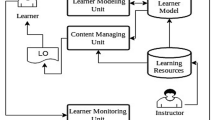Abstract
Sharable Content Object Reference Model (SCORM) is the most popular suite of technical standard among existing international standards for e-Learning; although it has been designed to provide accessibility, adaptability, interoperability, and reusability, it still suffers from lack of personalization, which may lead to inappropriate learning experience; In other words, learner may suffer from distraction or restriction, when it comes to interact with large or restricted amounts of information respectively, resulting in reduced learning efficiency and performance. However, this can be avoided by providing personalized services. In this paper, we propose a personalized SCORM learning experience based on Rating Scale Model (RSM), which takes into account both the difficulty of learning activity and the learner’s ability considering responses from individual learner’s understanding and characteristics. To obtain more accurate estimation of learner’s ability, polytomous Item Response Model (IRT) is used rather than dichotomous IRT. Experimental results show that the proposed system can exactly provide the closer learning resource to the learner’s ability, resulting in increased the learning efficiency and learning performance.
Access this chapter
Tax calculation will be finalised at checkout
Purchases are for personal use only
Preview
Unable to display preview. Download preview PDF.
Similar content being viewed by others
References
Sharable Content Object Reference Model (SCORM) 2004, Advanced Distributed Learning, http://www.adlnet.org/
Embretson, S.E., Reise, S.P.: Item Response Theory for Psychologists. Lawrence Erlbaum, Mahwah (2000)
Baker, Frank, B.: Item Response Theory: Parameter Estimation Techniques. Marcel Dekker, New York (1992)
Hambleton, R.K.: Item Response Theory: Principles and Applications. Kluwer Nijhoff Publisher, Boston (1985)
Nering, M.L.: The Distribution of Indexes of Person Fit within the Computerized Adaptive Testing Environment. Applied Psychological Measurement 21, 115–127 (1997)
Krimpen-Stoop, V., Edith, M.L.A., Meijer, R.R.: The Null Distribution of Person-fit Statistics for Conventional and Adaptive Tests. Applied Psychological Measurement 23, 327–345 (1999)
Krimpen-Stoop, V., Edith, M.L.A., Meijer, R.R.: Detecting Person Misfit in Adaptive Testing Using Statistical Process Control Techniques. Kluwer-Nijhoff, Boston (2000)
Baek, S.G.: Computerized Adaptive Attitude Testing Using the Partial Credit Model. Dissertation Abstracts International 55(7-A), 1922 (1995)
Koch, W.R., Dodd, B.G., Fitzpatrick, S.J.: Computerized Adaptive Measurements of Attitudes. Measurement and Evaluation in Counseling and Development 23, 20–30 (1990)
Dodd, B.G., De Ayala, R.J., Koch, W.R.: Computerized Adaptive Testing with Polytomous Items. Applied Psychological Measurement 19, 5–22 (1995)
Andrich, D.: Application of a Psychometric Rating Model to Ordered Categories Which Are Scored with Successive Integers. Applied Psychological Measurement 2, 581–594 (1978)
John, M.L.: Estimating Measures with Known Polytomous Item Difficulties. Rasch Measurement Transactions 12, 638 (1998)
Wang, T.I., Tsai, K.H., Lee, M.C., Chiu, T.K.: Personalized Learning Objects Recommendation based on the Semantic-Aware Discovery and the Learner Preference Pattern. Educational Technology & Society 10, 84–105 (2007)
Su, J.M., Tseng, S.S., Wang, W., Weng, J.F., Yang, J.T.D., Tsai, W.N.: Learning Portfolio Analysis and Mining for SCORM Compliant Environment. Educational Technology & Society 9, 262–275 (2006)
Chen, C.M., Lee, H.M., Chen, Y.H.: Personalized E-learning system using item response theory. Computers & Education 44, 237–255 (2005)
Chen, C.M., Liu, C.Y., Chang, M.H.: Personalized Curriculum Sequencing Using Modified Iitem Response Theory for Web-based Instruction. Expert Systems with Applications 30, 378–396 (2006)
Chen, C.M., Duh, L.J., Liu, C.Y.: A Personalized Courseware Recommendation System based on Fuzzy Item Response Theory. IEEE 2004, 305–308 (2004)
ADL Technical Team. SCORM Photoshop Examples Version 1.0 (2004), http://www.adlnet.gov/downloads/index.cfm
Author information
Authors and Affiliations
Editor information
Editors and Affiliations
Rights and permissions
Copyright information
© 2009 Springer-Verlag Berlin Heidelberg
About this paper
Cite this paper
Abbas, A.R., Juan, L. (2009). Personalized SCORM Learning Experience Based on Rating Scale Model. In: Yu, W., He, H., Zhang, N. (eds) Advances in Neural Networks – ISNN 2009. ISNN 2009. Lecture Notes in Computer Science, vol 5551. Springer, Berlin, Heidelberg. https://doi.org/10.1007/978-3-642-01507-6_78
Download citation
DOI: https://doi.org/10.1007/978-3-642-01507-6_78
Publisher Name: Springer, Berlin, Heidelberg
Print ISBN: 978-3-642-01506-9
Online ISBN: 978-3-642-01507-6
eBook Packages: Computer ScienceComputer Science (R0)




